The economic landscape of the Middle East has been experiencing a significant transformation in recent years, marked by growing cooperation between the Gulf Cooperation Council (GCC) states and Iraq. This newfound synergy is not only reshaping the economic dynamics of the region but also holds the promise of fostering stability and prosperity. The surge in Gulf investment in Iraq, particularly in sectors ranging from infrastructure to energy, underscores a strategic shift in regional partnerships and priorities.
The year 2023 witnessed a watershed moment for the Iraqi economy as the Saudi Public Investment Fund established the US$3 billion Saudi-Iraqi Investment Company, signaling a firm commitment to finance diverse sectors within Iraq. Following suit, Qatari conglomerate Estithmar Holdings inked memorandums of understanding worth US$7 billion with the Iraqi National Investment Commission, aimed at spearheading the development of modern cities, healthcare infrastructure, and tourism facilities. This surge in investment activity was further buoyed by the UAE’s pivotal role in port development and post-conflict reconstruction, alongside Kuwait’s endeavors to establish vital telecommunications corridors.
The momentum gained in 2023 continued unabated into 2024, with landmark agreements further solidifying Gulf-Iraq economic ties. The collaboration between the Saudi energy giant ACWA Power and the Iraqi Ministry of Electricity to develop a 1,000-megawatt solar power plant exemplifies a concerted effort to bolster Iraq’s renewable energy sector. Similarly, Emirati petroleum company Crescent Petroleum’s initiative to develop oil and gas fields in Basra and Diyala underscores the depth of commitment toward mutual economic progress.
Beyond infrastructure, Gulf investments in Iraq extend to the pivotal oil and energy sector, reflecting the GCC states’ recognition of Iraq’s strategic significance. Notably, Qatari interests represented by UCC Holding sealed a US$2.5 billion deal for the establishment of power plants, while QatarEnergy’s partnership with TotalEnergies in multi-billion-dollar projects underscores a broader commitment to Iraq’s energy landscape. These investments not only serve as a testament to Iraq’s economic potential but also underscore the strategic imperative for Gulf states to diversify their investment portfolios.
The resurgence of Gulf-Iraq economic cooperation marks a significant departure from the decades-long estrangement following Saddam Hussein’s invasion of Kuwait in 1990. The subsequent vacuum was swiftly filled by Iran, which capitalized on economic cooperation and political influence, thereby posing a challenge to regional stability. However, the evolving geopolitical dynamics and the imperative for regional security have prompted a reevaluation of relationships, leading to a thaw in Gulf-Iraq relations.
Diplomatic overtures, exemplified by Saudi Arabia’s reopening of diplomatic missions in Baghdad and Basra, laid the groundwork for enhanced economic collaboration. The premise underlying Gulf states’ engagement with Iraq lies in the recognition that stability in Iraq is intrinsic to the broader regional security architecture. The reopening of the Arar border crossing between Saudi Arabia and Iraq in 2020 served as a harbinger of enhanced economic integration, fostering bilateral trade and signaling a new era of cooperation.
Moreover, the growing detente between Iran and the GCC states, coupled with Iraq’s pivotal role, has created an environment conducive to sustained economic engagement. Gulf investments in critical sectors such as natural gas and renewable energy not only mitigate Iran’s influence but also empower Iraq to chart an independent economic trajectory. Prime Minister Mohammed Shia Al-Sudani’s proactive approach in fostering closer ties with Gulf allies underscores Iraq’s commitment to regional cooperation and stability.
As Iraq endeavors to strengthen its economy amidst political volatility and fluctuating oil prices, Gulf investment emerges as a beacon of hope. Beyond economic dividends, these investments hold the potential to foster greater regional integration, mitigate security challenges, and propel sustainable development. The strategic partnership between the GCC states and Iraq heralds a new chapter in regional cooperation, one characterized by mutual prosperity and shared objectives. In harnessing the collective potential of the Gulf and Iraq, the region stands poised to realize a future defined by stability, growth, and resilience.




